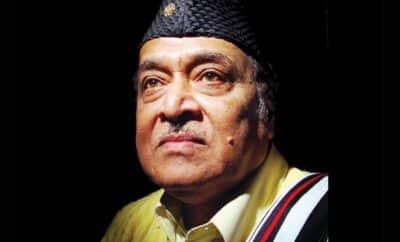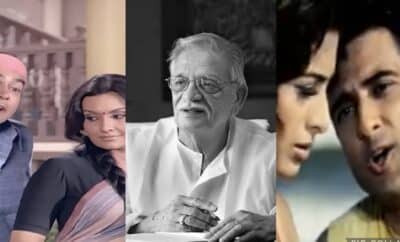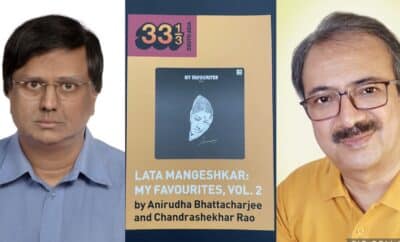Legends
The Curious Case of Rahul Dev Burman
Benjamin Button. Do you know the story – The curious case of Benjamin Button? A short story which was published for the first time in 1922, written by F. Scott Fitzgerald. It is a story of a man called Benjamin Button, born with the appearance of an 80 year old man and is already able to speak. As the years pass by, he plays with the small boys in the neighborhood just to obey his father. But he’s bored with the activities of the normal boys of that age. Soon his parents learn that Benjamin is aging backwards. Born as 80 year old, he starts getting younger with each passing year. All the people around him grow older in a usual manner while he grows younger. Usually a story or a play or a movie is told in a chronological form or with the help of flashbacks at the most. Even a fantasy story has a chronological order. But Benjamin Button defies all that is method and chronology. But the story is being read and valued in the present age too (a film with the same name was made in the year 2008). A rare case indeed. Such rare cases/stories keep reminding us that life is not always about chronology or calculations. Hasn’t Nida Fazli said –
Do aur do jod hamesha, chaar kahan hota hai
Soch samajh waalon ko thodi naadaani de Maula…
One has to have that innocence of a child to live life happily.
If we look around us we might find quite a few curious cases just as that of Benjamin Button (though not literally). Curious cases which give us happiness. Cases which give us pure joy and excitement. Cases which defy the normal life and yet we are connected to it instantly. For me, Rahul Dev Burman (Pancham) is one such case. A curious one. A rare one. As Benjamin Button ages in reverse, it is Pancham’s music which ages in reverse order. He began as a matured music composer and his music keeps getting younger as the years pass by. Born in a family which was absorbed in music, Pancham had music in his blood even before he was born. It was as if he was already a learned music scholar at the time of his birth, just as Benjamin Button was able to speak. At the age of 8 or 9 or even 10 when children normally are studying or playing with their peer group, Pancham was busy making tunes on his mouth organ. In the late teens, he was assisting his father, the giant musician and he was an independent music composer in his early 20s. Looking at the music of his first film Chhote Nawab (1961), when he was just 22, one can say that his musical maturity was that of a grown up, experienced artist. Who would otherwise give a song such as Ghar aaja ghir aaye badara sanwariyan….
Of course he was trained under Pandit Samta Prasad and Ustad Ali Akbar Khan. But the man is a superfine example of inborn talent. He not only excelled in the Indian classical music but also had abundant knowledge of Western music too. The early 60s had a few examples of Bossa Nova being used in the Hindi film music and Pancham used it in one of his initial films.
1966 established him as the music director with Teesri Manzil songs bursting on the top of all the music charts. And the man had not yet started experimenting. He found music in everything around him. Everything around inspired him to compose music. Be it the lightning sound or the gargling sound (that’s really bizarre). He loved to experiment new techniques and was forever ready to learn something new. Lakhon Mein Ek (1971) gave us the first slow motion song in the history of Indian cinema, where the song was recorded at the speed 3 times more than the normal recording using short staccato phrases.
With time, his music kept getting younger in films like Kati Patang, Hare Rama Hare Krishna, Amar Prem, Caravan, Buddha Mil Gaya, Ajnabee, Khel Khel Mein, Aandhi, Khushboo, Ghar, Kinara, Sholay, Hum Kisi Se Kam Nahi, Balika Badhu, Naukar, Dhongee and so many more….Pancham was ruling the music scenario of the 70s. Whatever songs he made, he kept the melody intact. He never wavered from his roots. That’s the reason he gave a number like Chhoti si ek kali khili thi….from Jurmana in 1979 which was inspired by Rabindra Sangeet – Basante phool ganthlo!!
https://www.youtube.com/watch?v=SET_weAPtP4&t=8s
On the other hand he gave us a dhamaka, disco song exercising his vocal chords with the melody intact!
His music has an international appeal with melody not missing throughout. His experimentations, his modulations never sounded scratchy. Even in a song having a transcontinental appeal, the sweetness was intact.
Pancham never shied away from inspirations. But he never copy pasted any song. The interludes had its own charm. Some of the songs inspired by his father’s earlier works got the due credit by the name of baap ka maal. No matter how many instruments he used in a song, each instrument got its independent share. Each instrument is clearly audible in his songs. Being a thinking, intelligent musician, he always saw that the song fit the situation and conveyed right sentiments to the audience. Even if he was at the peak of his career, he invested his time in his musicians, in human bonding and relationships. Whether it was a scolding someone got for coming on a bike in the rain or giving full payments to the other who wasn’t able to attend the music sessions because of some ailment. For Pancham, his musicians were his family. He ate with them, he cooked for them, he laughed with them, he discussed work with them. A eureka moment in the bath when Bhanu Dasgupta was playing some chords on the guitar sitting in the room, gave us a song like…Musafir hoon yaaron. A simple practice of beats by Ranjit Gazmer on the maadal gave us a song like….Tere bina jiya jaaye na. These 2 examples show his presence of mind musically. It didn’t matter from where the music came. Rubbing sandpaper or mere blowing air in empty bottles was music for him. Using different instruments, learning about them and improvising them at right places was his inborn skill. And this was not restricted to the songs alone. Pancham gave us some of the best background scores. The connection of his music is so strong that with every scene, the music automatically pops up in the mind. The youth connected with the songs readily.
80s also saw the downfall of his career, commercially. The films which he gave music to, flopped in a row. People started distancing from him, calling him jinxed. He was left alone by the so-called friends in the industry. But even in this morose situation, Pancham grew musically. Time came when he had negligible or no work at all. But his compositions got deeper roots and became more and more relatable, making them timeless.
https://www.youtube.com/watch?v=3cblkdDK1HM
Being a sensitive person, Pancham’s health was affected in a big way with all the back stabbing in the industry. But the music man in him still had those wonderful sparks of life. To make music which was pleasing to the ears as well as heart, was his forte. Perhaps that’s the reason his music has an ever youthful charm and it just accelerates with each song you hear. Having a long lasting effect like his favourite perfume Grey Flannel. Refreshing and exhilarating. Getting to know his music, especially in the later years, getting addicted to it, is a luxury everyone can’t afford. Parinda, Drohi, Gardish, Libaas are some of the films where he showed that he had not lost the magical touch and was as aesthetic as he was when he came in the industry.
Though I’ve enlisted some of his songs in a chronological order, the charm of those songs has been reverse aging. His songs have been turned into timeless beauties. In every generation, youth will connect to music with his songs. They’ll experience the feeling of time standing still in those ecstatic numbers. Sometimes giving happiness, sometimes guiding, sometimes lifting the mood and at other times just giving that flamboyant zing required in life…..as youthful and panache as his….Wakaao!!




Bharat Deshmukh
June 27, 2020 at 10:12 am
Just superb….Curious Case of Deepa Buty. That’s what should be the title of the book on you.
Ajay Poundarik
June 28, 2020 at 5:21 pm
An Excellent Write-Up, As Usual. Nothing against R D Burman, Undoubtedly he was great. It is written that R D Burman ruled the “70s”, NO ! Having witnessed hindi film music from 1963 onwards, I differed to the statement. Laxmikant-Pyarelal ruled the hindi film music from 1967 onwards. NO DOUBT ! In seventies R D Burman along with Kalyanji-Anandji gave the tough challenge to Laxmikant-Pyarelal. Because of the tough competitions between the legendary music directors, Laxmikant-Pyarelal, R D Burman and Kalyanji-Anandji we got to listen to some fabulous songs in seventies.
Joy Christie
June 29, 2020 at 4:33 pm
Very well written write up as always. Yes you gave perfect example of Benjamin Button. The earlier movies matured music and gradually more and more young.
sandeep kulkarni
July 3, 2020 at 6:43 pm
Very Nice Deepa….you have covered entire span of pancham’s music and his personality…
Pingback: Carnival of Blogs on Golden Era of Hindi Film Music – July 2020 – The world is too small? or Is it?